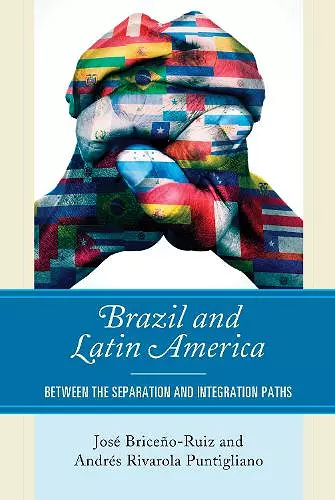Brazil and Latin America
Between the Separation and Integration Paths
José Briceño-Ruiz author Andres Rivarola Puntigliano author
Format:Paperback
Publisher:Lexington Books
Published:11th Feb '20
Should be back in stock very soon

Brazil and Latin America: Between the Separation and Integration Paths challenges the “separatist” bias in the vision of Brazilian relations with its Latin American neighbors. By exploring the parallel existence of a path of integration, the focus of this study is on those forces which have intended to forge different forms of alignment, integration, and, sometimes, rightward union between Brazil and different Latin American countries. The authors analyze the ideas and projects inherent in the mindset of elites even before independence. They show that the path of integration has been more influential than is generally known. Ultimately, this book demonstrates the complexity around policy-making, debates on foreign policy, and the history of shaping the Brazilian self.
In this elegant and stimulating book, Briceño-Ruiz and Rivarola Puntigliano present us with a courageous and much needed synthesis of a history that is still open. Its pages takes us back from a remote past to a future yet to be built. -- João Paulo Pimenta, University of São Paulo
Briceño-Ruiz (Univ. of the Andes, Colombia) and Puntigliano (Univ. of Stockholm, Sweden) offer a diplomatic intellectual history of Brazil's unsteady relationship with Hispanic America. Brazilian thinkers tend to contrast Brazil with its neighbors, citing original Luso-Spanish differences, Brazil's 1822 non-violent independence, its 19th-century monarchical stability, and its mammoth geographic and economic stature. The "path of separation" of the "Brazilian island" led many to omit Brazil from "Latin America." Even Bolivar agreed; Brazil was just too different. All the while, however, Brazilian thinkers have entertained notions of "paths of integration" based on an Argentine-Brazil axis aimed at holding off a return of European colonialists. It never panned out, partly because of the several states' attempts at economic autocracy and import substitution. Some saw Latin American integration as an attempt at Brazilian dominance, which did not thrill its neighbors. The latest effort was the 1991 Mercosur of the Southern Cone countries…. Good corrective to the modern tendency to reify "Latin America." Summing Up: Recommended…Graduate students through faculty. * CHOICE *
In this elegant and stimulating book, Briceño-Ruiz and Rivarola Puntigliano present us with a courageous and much needed synthesis of a history that is still open. Its pages takes us back from a remote past to a future yet to be built. -- João Paulo Pimenta, University of São Paulo
International Relations scholars specialized in studying the efforts for South-American integration seldom acknowledge the crucial role played by Brazil in this process, despite recognizing its position of regional power. This book by Briceño-Ruiz and Rivarola Puntigliano not only analyzes the Brazilian trajectory of pro-integration ideas, policies and initiatives; but it also deepens the discussion around Brazil's foreign policy and the ambivalent profile adopted by the country in face of the challenges posed to the integration. A remarkable effort in updating and enriching our understanding on this theme. -- Carlos Vidigal, University of Brasília
ISBN: 9781498538473
Dimensions: 222mm x 155mm x 15mm
Weight: 304g
198 pages